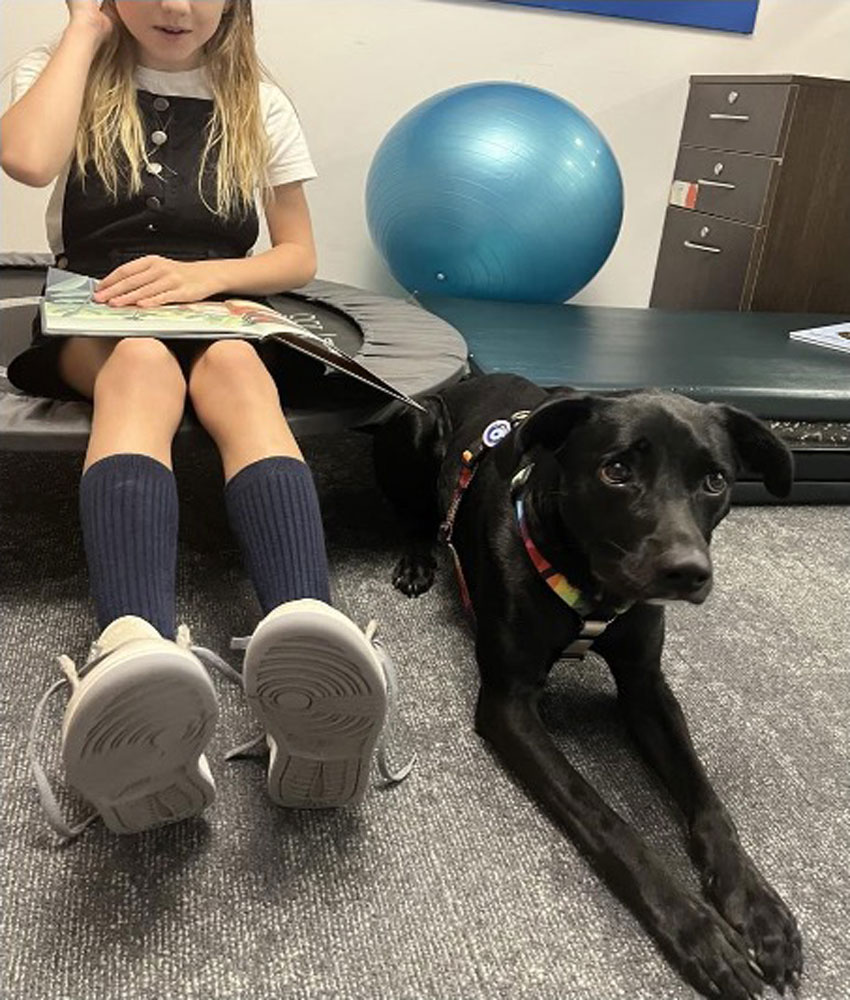
Frankie with students at the American School of Bombay. (Photo source: Marci Carrel)
--------------------------------------------------------------
In our dynamic open learning spaces at the American School of Bombay, a unique and impactful addition to the campus has sparked genuine conversations and elevated spirits. This noteworthy addition is none other than Frankie, the Elementary School Dog. Far from being mere anecdotal tales, tongues are wagging about the positive effects of Frankie's presence which has become a compelling narrative at our institution.
As we transitioned back to our physical campus after the virtual stint due to the COVID-19 pandemic, the mental health of our students took precedence. My longstanding belief in the therapeutic effects of animals, coupled with my recent adoption of Frankie—a dog displaying a remarkable affinity for children—prompted me to seek an exception to our traditional "no pets on campus" policy. Undertaking thorough research, I explored both the positive and potential challenges associated with introducing a dog to the school environment. The responsibility inherent in my role as the Elementary School Principal underscored the need for a meticulous approach. The results, however, have exceeded expectations, enhancing the sense of connection and elevating spirits among students, staff, and parents alike.

The documented benefits of having a canine companion on campus align with expectations, such as reducing stress and anxiety, elevating mood, improving behavior and confidence, instilling a sense of responsibility, and fostering a connection among students, staff, and parents. However, the unforeseen positive outcomes at our school have surpassed initial expectations, creating an atmosphere of happiness and enhanced connection.
In addition to the well-established benefits, our experience with Frankie on campus has unveiled further advantages. These include heightened language use in students with language challenges, accelerated progress in speech and language-centered goals, increased motivation in Occupational Therapy sessions, and the promotion of self-advocacy among individuals less comfortable or allergic to dogs. Furthermore, the introduction of a dog has illuminated the power of child-initiated learning, showcasing the benefits of organic, self-driven educational experiences.

Two compelling case studies underscore the transformative impact of Frankie on our students. In one instance, a student named Max, initially terrified of dogs, developed a profound connection with Frankie, overcoming fears and gaining a newfound sense of control and confidence. Another case involved a child with selective mutism who, through interaction with Frankie, not only overcame communication barriers but actively engaged in conversation, demonstrating the dog's unique ability to facilitate communication.
While the positive impact of Frankie on campus is evident, the responsibility lies with the handler, acknowledging that, like humans, dogs have varying needs and communication styles. The reciprocal nature of the relationship demands careful attention to signs of benefit for both parties involved.
As tongues continue to wag in positive discourse and Frankie's tail wags with joy, our journey with canine companionship at the American School of Bombay persists. The ongoing success of this initiative reinforces the notion that the introduction of a four-legged friend has not only enriched our educational environment but has also become an integral part of our collective well-being.
--------------------------------------------------------------
Marci Carrel is the Elementary Principal at the American School of Bombay. She is also the handler of the most popular member of the elementary school staff, Frankie. Marci and Frankie have been working together for three years and are recognized as a therapy dog team in both India, by the Animal Angels Foundation, and internationally, by Pet Partners. Together they have taken on the challenge of increasing student and adult wellbeing through human-animal connections.